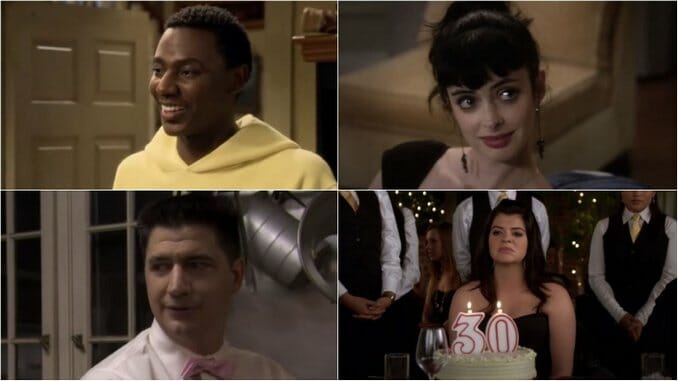12 Great Sitcoms That Were Cancelled Too Soon
All images are YouTube screenshots
Streaming services and network television are chock-full of mediocre shows that keep going thanks to high ratings (The Big Bang Theory) or excellent sitcoms that ended up jumping the shark (The Office). Entertainment executives tend not to care about quality shows that fly under the radar, accruing a small but passionate fan base, and instead go for those which have universal, if uninspired, appeal. Consider the cases of Modern Family and Community, both of which premiered in the fall of 2009. The former stuck to a mockumentary format, already proven successful with The Office, and ran successfully for 11 seasons, garnering 22 Emmys in that time. The latter, on the other hand, frequently veered into meta territory with parodies of beloved films and takes on different tropes, but faced cancellation multiple times during its six season run.
Community’s cult following brought it back from the brink of death more than once, but not all sitcoms are so lucky. Listed below are 12 of the best shows that lasted for only three seasons or fewer and ended before their time. That is, these shows aren’t short by design; if we included those, then we’d have to list nearly every British comedy ever made. All of these sitcoms, whether hidden gems or well-known entities, deserved much more time on air.—Clare Martin
12. The Grinder (2015—2016)
What happens to a big star when they leave the small screen? In the case of Dean (Rob Lowe), star of the hit fictional law drama Grinder, he moves back to his hometown of Boise, Idaho to see if he can be a real-life lawyer just like his mousy brother Stewart (Fred Savage). Dean’s unrealistic expectations of the courtroom are grounded by Stewart, but the latter also finds himself pushed to be bolder thanks to his brother’s gumption. Parks and Recreation fans will be pleased to see Natalie Morales appear as Dean’s potential love interest. In the era of peak TV, The Grinder may have gotten lost in the shuffle, but its meta commentary on entertainment and delightful cast (except for Savage, that is) warranted a larger audience.—Clare Martin
11. Grand (1990)
Grand is a great example of how network intervention can destroy a show. In its first season Grand felt like nothing else on TV at the time. It was a serialized parody of soap operas that made a point of addressing serious class issues and income disparity during a recession with grace and empathy and in a way that was rarely preachy. Despite good reviews, a great cast (including Pamela Reed, Michael McKean and Joel Murray) and a plum Thursday night time slot right after Cheers, it didn’t immediately set the ratings on fire. It was solid enough to bring back, but for the second season the network changed almost everything that made it stand out. It became a standard sitcom focused on a single family, and whatever audience it had quickly bolted.—Garrett Martin
10. Better Off Ted (2009—2010)
Can a person follow their conscience while working for an unethical corporation? Better Off Ted explores this existential question with unhinged surrealness through the antics of the titular Ted (Jay Harrington), the Don Draper of research and development at Veridian Dynamics. He often finds himself at odds with his own morals on the job, since Veridian is just about as soulless as any sprawling company that dabbles in everything from food to weaponry (his love interest Linda even steals creamer from the corporation in a quiet act of rebellion). A must-see episode is the first season’s “Racial Sensitivity,” in which motion-sensing technology at the office fails to recognize Black employees, so caucasian people are hired to follow them in “Operation White Shadow.” Its skewering of racist technology and empty corporate responses to discrimination remain incredibly relevant.—Clare Martin
9. Andy Richter Controls the Universe (2002-2003)
Victor Fresco makes this list twice with two of the best sitcoms of the ‘00s. Andy Richter Controls the Universe is the first and more obscure of the two (the other being Better Off Ted, of course), and although it’s set around a workplace it owes more to Seinfeld than the classic MTM model. Despite good writing and a great cast Richter limped through two lowly rated half-seasons. It’s one of the earlier network sitcoms to eschew laugh tracks and use the single-camera model, which gave it a unique identity, but perhaps it was too alienating to fans of That ‘70s Show or whatever else aired on Fox that night.—Garrett Martin
8. Ben and Kate (2012—2013)
Before she became a part of one of the most notoriously horrible/boring film franchises of the last decade or thankfully took Ellen Degeneres down a peg, Dakota Johnson starred in Ben and Kate. Johnson played the young single mom Kate, living with her wild card brother Ben (Nat Faxon, currently on A League of Their Own). She juggles getting back into the dating world while caring for her daughter, Maddie (Maggie Elizabeth Jones, one of those rare enjoyable child actors), and Ben, who’s essentially just a giant kid. The family dynamic provides a lot of heart, but the stellar comedic performances from Johnson, Faxon and series regulars Lucy Punch and Echo Kellum are what make us miss this show so very much.—Clare Martin
-

-

-

-

-

-

-

-

-

-

-

-

-

-

-

-

-

-

-

-

-

-

-

-

-

-

-

-

-

-

-

-

-

-

-

-

-

-

-

-








































